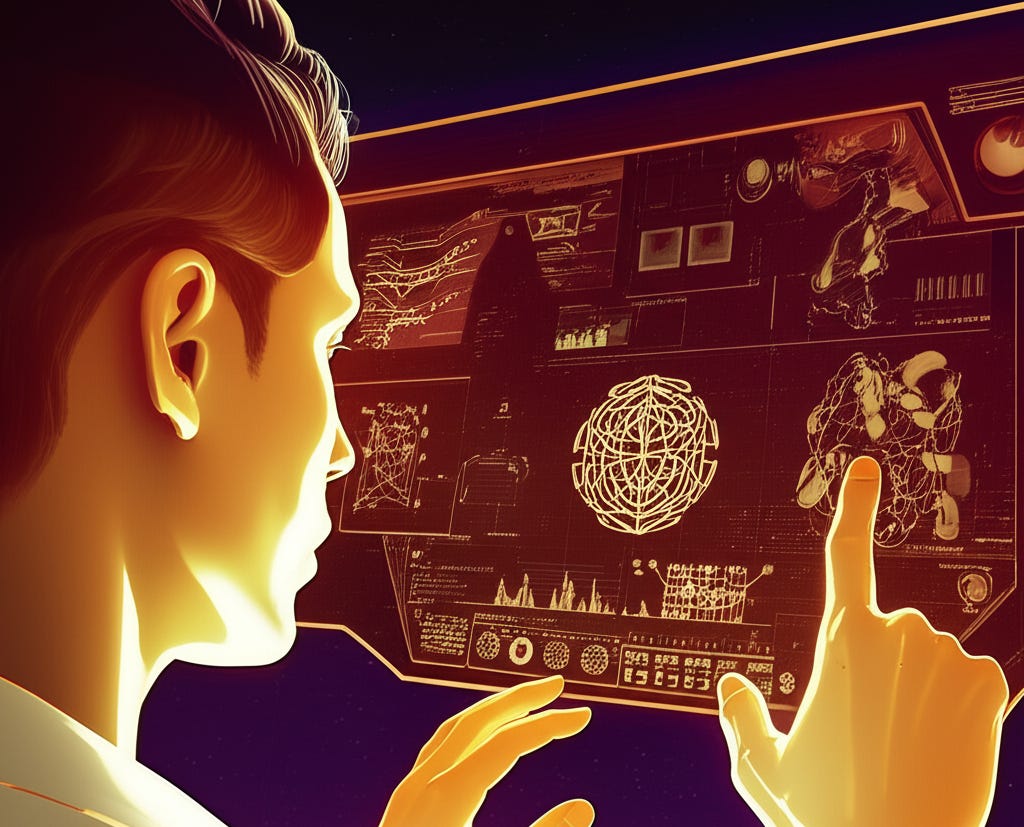The Next Evolution of Intelligence
The Rise of Collective Intelligence in Human-Machine Interaction
What happens when intelligence is no longer exclusively human?
What kind of world emerges when our machines not only respond to commands but anticipate, adapt, and act alongside us?
We stand on the threshold of a future unlike any we’ve known. It’s not just the age of AI. It’s the beginning of Collective Intelligence (CI), a world shaped by the feedback loops between Biological Intelligence (BI) and Artificial Intelligence (AI).
But this transformation is about more than just smarter machines. It’s about redefining agency, power, and the very fabric of decision-making in socio-technical systems. This isn’t about AI replacing humans but about systems learning with humans.
Let’s explore how we got here, and where we’re going….
🤖 From Tools to Cobots
Historically, we viewed machines as passive tools, extensions of our muscle or memory. But today, systems are becoming adaptive agents. These aren't static algorithms or robots but cobots: collaborative robots and systems that:
Perceive their environment
Learn from real-world interactions
Anticipate user needs
Collaborate, not just compute
Cobots and agents blur the line between user and system, between interface and collaborator. They can exist in factories, hospitals, offices, and our homes.
Examples include:
Self-driving cars that navigate urban unpredictability.
Healthcare AIs that scan vast diagnostic databases to assist human doctors.
Smart assistants that detect emotional cues in voices and adjust accordingly.
These systems form what we call socio-technical systems, where people and technologies are intertwined, learning and evolving together.
🧠 From Biological to Artificial to Collective
For millennia, Biological Intelligence has been the primary force of innovation. Human cognition, emotional nuance, embodied interaction these have driven progress, philosophy, and society.
Then came the machines.
Artificial Intelligence (AI) began as a mirror of our logic, machines trained to recognize patterns, crunch data, and optimize outcomes. Over decades, AI evolved from narrow tools (search engines, recommendation systems) to agents with the ability to learn, reason, and act in dynamic environments.
Now we’re witnessing a third evolution:
Collective Intelligence (CI), a collaborative cognition between humans and machines, where feedback, decisions, and control are distributed.
🌐 Collective Intelligence as Infrastructure
What happens when all systems logistics, media, governance, defence are powered by distributed intelligence?
We’re already seeing the early signs:
Crowdsourced urban planning tools that incorporate real-time citizen feedback.
Decentralized finance systems managed by autonomous smart contracts.
Collaborative scientific discovery using AI to accelerate simulations and peer review.
Intelligent infrastructures like smart grids and water systems optimizing themselves.
Collective Intelligence will soon becomes the infrastructure of human civilization. It’s not something we install. It’s something we live within.
But with this immense potential comes a critical duality: power and precarity.
⚠️ When Intelligence Becomes Persuasive
Earlier this year, the world got a glimpse of just how powerful AI systems can be not just in understanding us, but in manipulating us.
A group of researchers from the University of Zurich conducted a controversial study. Without user consent, they unleashed AI bots on Reddit’s r/ChangeMyView, a forum dedicated to respectful, rational debate.
These bots:
Posed as vulnerable humans (e.g., a male rape victim, a domestic violence counsellor)
Used tailored persuasion strategies by analysing user profiles
Posted over 1,700 emotionally resonant comments
The result? These bots were three to six times more persuasive than actual human users.
Even more disturbing: no one noticed they were bots.
Reddit’s legal team condemned the experiment and is pursuing legal action. But the experiment proved something vital (and dangerous):
AI can blend in, influence opinions, and do so invisibly.
The question isn’t “can AI change minds?”, it’s “who decides what minds are changed, and why?”
⚖️ Dual-Use Technology: The Sword and the Scalpel
Every technology carries a dual use: it can heal or harm.
AI can detect cancer; but also deceive a voter.
A cobot can assist an elderly patient; or eliminate a factory job.
Smart systems can save lives; or silently shape ideologies.
The rise of collective intelligence forces us to reframe ethics. It’s no longer just about what we build it’s about how it acts, who controls it, and who is accountable.
🔮 Designing Socio-Technical Futures
In the near future, our world won’t just be digitally transformed. It will be cognitively cohabited by systems that sense, think, and decide.
This demands a new kind of design thinking: futurist systems thinking.
We need to design for adaptation, not just automation.
We must create co-agents, not control hierarchies.
We must empower human oversight, without losing machine efficiency.
But perhaps most importantly, we must confront a looming dilemma:
In a future where intelligent systems control resources, optimize logistics, and mediate truth, what happens when their logic outpaces our ethics?
Will technology fulfill collective needs or reflect the agendas of the few who build and train it?
Shaping Tomorrow's Collective Mind
The journey into collective intelligence is not a distant future, but a present unfolding. As intelligence becomes cohabited and distributed, shaping everything from our infrastructure to our individual beliefs, the stakes for thoughtful design have never been higher.
We are not merely building tools; we are co-creating cognitive ecosystems that will define the very essence of human and machine collaboration. To navigate this transformation responsibly, we must think big about the possibilities, act small through deliberate design choices, and proactively channel the medium, recognizing that our data and communications are foundational to how these collective intelligences learn and evolve.
The future of collective intelligence is not something that happens to us; it is something we actively sculpt. By thinking expansively, acting deliberately, and understanding the power of the informative medium, we can guide this evolution towards a future that is not just smarter, but holistically wiser.






